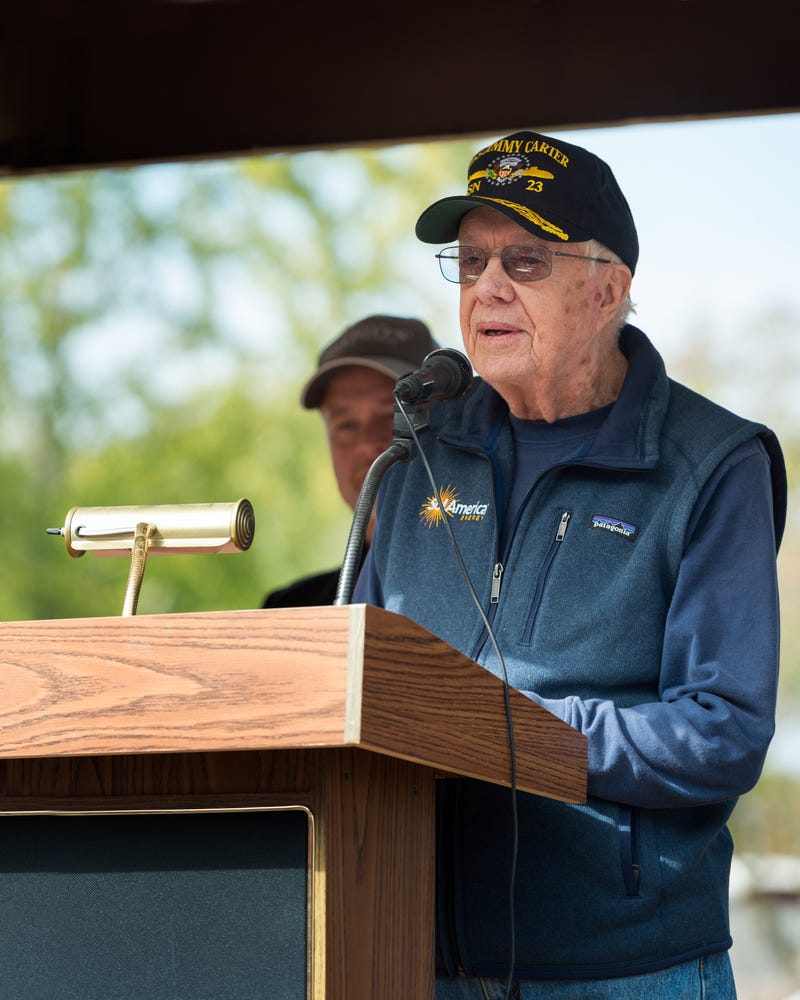|
For a few days now, I have obsessed over a nagging injury. I could only write a sentence or two before needing to change position or take a break for an ice pack, a heating pad, or an anti-inflammatory pain killer. Life was being so unfair, I thought. Then I heard that Jimmy Carter had died, and I recalled an incident a few years ago when he fell at home in Plains, Georgia and hit his head. The next day, with a blackened left eye and a bandage over his fourteen stitches, Jimmy Carter was out pounding nails at a Habitat for Humanity work site in Nashville.
If Jimmy Carter could do that in his 90s, I can surely sit down today and type a few words. If he could play hurt, so can I. That’s how leadership by example works. Also, it doesn’t really feel like there’s a knife inserted between my shoulder blade and my spine. That’s merely an unhelpful exaggeration.
Jimmy Carter learned some of his leadership lessons as a member of the United States Naval Academy Class of 1946. In June of 1978, he returned to his alma mater to deliver the commencement address. In it, he reminisced about his own graduation—Admiral Chester Nimitz spoke—and of his seven years in the Navy, which he left reluctantly after his father died in order to run the family farm.
Early in his speech, President Carter laid out some broad foreign policy goals that sound like something we should aspire to in both domestic and foreign policy today:
“Our principal goal is to help shape a world which is more responsive to the desire of people everywhere for economic well-being, social justice, political self-determination, and basic human rights.
We seek a world of peace. But such a world must accommodate diversity—social, political, and ideological. Only then can there be a genuine cooperation among nations and among cultures.
We desire to dominate no one. We will continue to widen our cooperation with the positive new forces in the world.”
Then, at the end of his remarks, Carter returned to those goals and the qualities that our nation would need in order to attain them:
You and I leave here today to do our common duty—protecting our Nation’s vital interests by peaceful means if possible, by resolute action if necessary. We go forth sobered by these responsibilities, but confident of our strength. We go forth knowing that our Nation’s goals—peace, security, liberty for ourselves and for others—will determine our future and that we together can prevail.
To attain these goals, our Nation will require exactly those qualities of courage, self-sacrifice, idealism, and self-discipline which you as midshipmen have learned here at Annapolis so well. That is why your Nation expects so much of you, and that is why you have so much to give.
I leave you now with my congratulations and with a prayer to God that both you and I will prove worthy of the task that is before us and the Nation which we have sworn to serve.
The qualities of courage, self-sacrifice, idealism, and self-discipline that Jimmy Carter attributed to the USNA Class of 1978 were characteristics that he displayed throughout his life. The humility of his “prayer to God that both you and I will prove worthy” was no affectation for him. And while humility is not among the fourteen leadership traits I was taught in the Marine Corps, it has been present in all of the leaders I have admired. I see it as a combination of some of those traits: unselfishness, tact, loyalty, and bearing. I could list them all here and find Jimmy Carter in each one.
When he was in his nineties and swinging a hammer in Nashville just a day after getting stitches in his head, that was endurance: the ability to withstand pain, fatigue, stress, and hardship. When he was in his twenties and leading a team into a nuclear reactor for cleanup after a meltdown, that was courage: no need to define it; just think of Jimmy Carter.
You're currently a free subscriber to Trygve’s Substack. For the full experience, upgrade your subscription.
